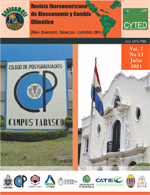Effect of three microbial consortia in corn (Zea mays L.) in Villaflores, Chiapas
DOI:
https://doi.org/10.5377/ribcc.v7i13.11424Keywords:
Corn, Microorganisms, Growth, BiomassAbstract
The present research was carried out with the aim of evaluating the effect of mountain microorganisms (MM) on growth variables and biomass production of the corn agroecosystem under agroecological management in Villaflores, Chiapas, Mexico. The microbial consortia were elaborated by the technique of reproduction and activation of MM and three different treatments were obtained: MM1 (“La Frailescana” Natural Resources Protection Area), MM2 (“La Sepultura” Biosphere Reserve), MM3 (Cerro Nambiyuguá, Villaflores municipality); and a control equivalent to the chemical fertilizer (compost + ammonium sulfate). A 4X4 latin square experimental design was used and the application of the microbial consortia was carried out at 20 and 50 days after sowing (DDS, by its acronym in spanish) with concentrations of 50% (Sol. 50% concentrated MM + 50% water) and at 60 DDS at 75% (Sol. 75 % MM concentrate + 25% water). At 35 DDS and 60 DDS, MM3 obtained significantly greater effects on the crop than the other treatments, in the case of the plant height variable. At 60 DDS, MM2 equaled MM3 and the control with stem diameter values ranging between 1.99 and 2.08 cm. The highest global dry biomass production was maintained in the MM3 treatment. The MM3 treatment, whose source of inoculum comes from the site closest to the region of the experimental area, obtained greater effects on the growth indicators and biomass production.
Downloads
Published
How to Cite
Issue
Section
License
Copyright (c) 2021 Ibero-american JournalL of Bioeconomy and Climate Change e-ISSN 2410-7980

This work is licensed under a Creative Commons Attribution-NonCommercial-ShareAlike 4.0 International License.
Copyright © 2022 Rev. iberoam. bioecon. climate change Graduate School and UNAN-León, School of Agricultural and Veterinary Sciences / Department of Agroecology / Center for Research in Bioeconomy and Climate Change (CIByCC).






